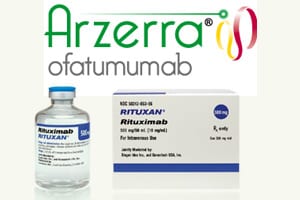
The U.S. Food and Drug Administration (FDA) just strengthened the warnings on two blood cancer drugs over the medications’ association with a reactivation of the hepatitis B virus in some people. GlaxoSmithKline Plc’s Arzerra (ofatumumab) and Roche Holding AG’s and Biogen Idec Inc.’s Rituxan (rituximab) have been associated with increased risks for immunosuppression-related hepatitis B […]
 The U.S. Food and Drug Administration (FDA) just strengthened the warnings on two blood cancer drugs over the medications’ association with a reactivation of the hepatitis B virus in some people.
The U.S. Food and Drug Administration (FDA) just strengthened the warnings on two blood cancer drugs over the medications’ association with a reactivation of the hepatitis B virus in some people.
GlaxoSmithKline Plc’s Arzerra (ofatumumab) and Roche Holding AG’s and Biogen Idec Inc.’s Rituxan (rituximab) have been associated with increased risks for immunosuppression-related hepatitis B virus (HPV) reactivation in patients who had been previously infected with the virus, according to Reuters. The increased risks for HPV reactivation led to the so-called “Black Box” warning, which is the FDA’s most serious warning.
Arzerra received approval in the United States in 2009 and is approved for the treatment of chronic lymphocytic leukemia (CLL). Rituxan received approval for the treatment of several conditions including CLL, as well as non-Hodgkin’s Lymphoma, vasculitis, and rheumatoid arthritis, according to Reuters. Arzerra and Rituxan are both anti-CD20-directed monoclonal antibodies, MedPageToday explained.
Both treatments suppress the body’s immune system. The immune system is critical to fighting infections; therefore, a reactivation of hepatitis B—a serious liver infection—while taking these medications can lead to chronic infection, liver failure, liver cancer, or cirrhosis of the liver, Reuters reported. Hepatitis B, which can also cause permanent scarring of the liver, is spread by contact with infected blood and bodily fluids.
Hepatitis virus reactivation can occur in patients who had been previously infected with the hepatitis B virus even if the infection had been clinically resolved, according to MedPageToday. If the hepatitis B virus (HBV) remains latent in a patient’s hepatic tissue and that individual becomes immunosuppressed—which is what can occur with Rituxan and Arzerra treatments—the disease can reactivate and lead to liver failure and death.
More than 100 potential cases of fatal HBV-associated hepatic injury associated with Rituxan and Arzerra were reported in the FDA’s Adverse Event Reporting System (FAERS) database, MedPageToday reported. Of the 109 reported cases of hepatitis B-associated injury with the drugs, 106 involved Rituxan and three involved Arzerra.
Risks of HPV reactivation tied to Arzerra and Rituxan are described on the products’ “Warnings and Precautions” labels’ section; however, the agency stated that reactivation—with some involving death—continue to occur, Reuters explained.
The agency recommends physicians screen all of their patients for the hepatitis B virus before starting either of these medications and that they monitor patients whose tests reveal evidence of prior hepatitis B infection for indications that the virus has reactivated; monitoring should continue for months after therapy has discontinued, according to MedPageToday.


